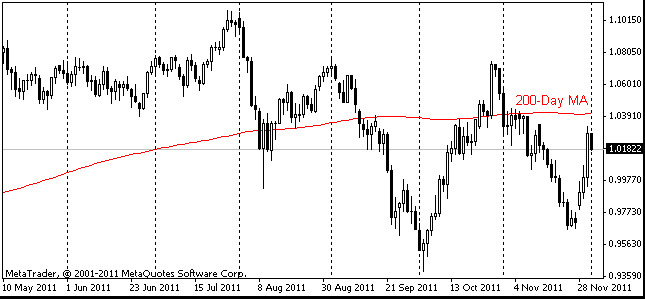EUR/usd
Moody's unexpected decision to downgrade 6 European countries has provoked an increase in demand for safe assets during the London session. The single currency didn't manage to push the attack, having stopped at 1.3283. The EUR sales brought the currency pair below Friday's low in the area of 1.3250. It's really of interest for what time the pair will stay under pressure. After all, the market is already so much lopsided in relation to positioning plus the information about the ratings can hardly be called new as well. As a rule, the markets show the strongest reaction to the first steps taken by the rating agencies, while the further ones (and this is the case now) are generally ignored. It's notable that despite the fact that ratings were cut mainly in Europe, the major movements today are observed not in the euro/dollar. There is enough news on other currencies as well.

GBP/USD
Yesterday the British pound got a heavy blow, from which it cannot recover even today. Rating agency Moody's put the British top rating to review for possible downgrade. What is particularly offensive to the British is that behind such a move is the EU sovereign debt crisis, which Britain can hardly affect. Last time when the highest credit rating of the country ran the risk of being cut the reason was said to lie in the budget deficit and need for structural changes in the economy. Then the country did all that was necessary, but now it mainly has to watch the situation on the continent from the sidelines. During the Asian session the British pound fell against the dollar below 1.57 against the high of 1.5930 in the middle of last week. Probably Tuesday won't be the best day for the pound.

USD/JPY
The bank of japan surprised most market participants by expanding its asset purchase programme by other 10 trln. yen. Now the programme size totals 65 trillion. Basically, the money will be spent on purchasing government bonds. Who else, except for the Bank of Japan, will do that to maintain the low yield of government debts? After all, the savings in the country are reducing, while the state spending during the economic recovery and tax revenue decline should stay high. We really wonder when it will be possible to say with certainty that the Bank of Japan monetizes the government debt. Anyway, the market reaction to this news met BOJ's expectations: the yen has fallen and is now trading at 78.0, near the 200-day MA; stock markets, despite poor news on Europe, are trading positive. BOJ has taken quite a logical step, but it is unlikely to be the last one.

AUD/USD
Today the Australian dollar is trading negative against the U.S. currency on the news from Moody's. The aussie didn't manage to show any impressive momentum on Monday and today again has fallen in the area of Friday's lows, that is at 1.0670. It's interesting that for all that the business conditions index from the NAB should display a certain improvement in January, which may signal that affairs on the other side of the world are not that bad.
